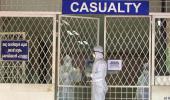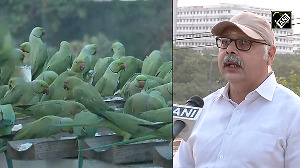The Indian Council of Medical Research was in talks with the Serum Institute of India for local manufacturing of monoclonal antibodies (MABs). However, it did not take off, as the volume was much less in India.

On Sunday, yet another case of the deadly Nipah virus was confirmed in Kerala, the sixth such incident reported in the state since 2018.
This time, the victim was a 24-year-old man from Malappuram's Thiruvali panchayat, around 20 kilometres away from Pandikkad, where a 14-year-old died in July this year due to Nipah.
The victim was a student in Bangalore and was reported dead on September 9.
The young man was diagnosed with the Nipah virus during a test conducted at Kozhikode Medical College, which was later confirmed by the National Institute of Virology in Pune.
More than 150 people are currently under observation, and two of them, who are showing symptoms like fever, are being kept in hospital.
The district collector has issued a list of containment zones in the area and also declared holidays for all educational institutions in the region.
Shops are allowed to open between 10 am and 7 pm, while masks are declared mandatory for all.
Business Standard looks into the causes of Nipah, its symptoms, treatment, and the history of reported Nipah cases in India so far.
What is Nipah?
Nipah virus is a zoonotic virus transmitted from animals to humans.
The virus was first identified in Malaysia in 1998 by a team of researchers from the University of Malaya.
The disease was named after a village called Sungai Nipah in Malaysia.
Interestingly, Nipah is estimated to have a case fatality rate as high as 75 per cent, with the potential to trigger another pandemic.
It is transmitted to humans mainly from fruit bats, pigs, contaminated fruits, or through human-to-human transmission.
Symptoms
Symptoms in human beings can range from asymptomatic infection to acute respiratory infection.
Initial symptoms include headache, muscle pain, vomiting, and sore throat, later leading to severe respiratory issues, atypical pneumonia, and neurological issues such as encephalitis.
Other symptoms include dizziness, drowsiness, and altered consciousness.
Prevention and Treatment
At present, there are no vaccines or drugs available for Nipah virus.
During an outbreak, individuals should avoid contact with sick pigs and bats, avoid contact with blood and body fluids of an infected person, and direct contact with them.
During the 2018 outbreak, a non-patented drug developed by Christopher C Broder from Australia was imported for compassionate use from the University of Queensland.
Last year, Business Standard had reported that the Indian Council of Medical Research was in talks with the Serum Institute of India for local manufacturing of monoclonal antibodies (MABs).
However, it did not take off, as the volume was much less in India.
Nipah Outbreaks In India
January 2001: 66 cases were reported in West Bengal's Siliguri, claiming 49 lives.
February 2007: Nipah in a border village in Nadia district of West Bengal killed five individuals with a case fatality rate of 100 per cent.
May 2018: 17 patients succumbed to the disease; two recovered fully in Kozhikode.
June 2019: A 23-year-old student was diagnosed in Ernakulam.
September 2021: Virus claimed the life of a 12-year-old boy in Pazhur, Kozhikode.
August-September 2023: Six cases and two deaths were reported in Kozhikode.
July 2024: One person died in Pandikkad in Malappuram district in Kerala.
September 2024: A 24-year-old man from Malappuram's Thiruvali panchayat reported dead.
Feature Presentation: Ashish Narsale/Rediff.com











